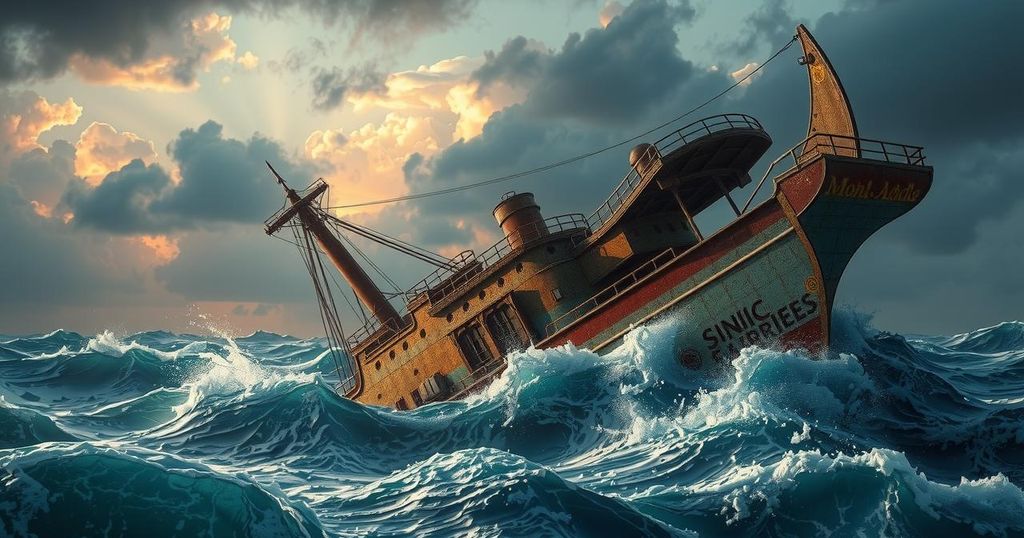Moscow Ship Sinks Amid Heightened Military Ties With North Korea

The Ursa Major, a Russian cargo ship, has sunk amid reports it was collecting weapons in Syria. Ukrainian President Zelensky highlighted partnership risks between Moscow and North Korea, noting over 3,000 North Korean casualties. Italy plans to extend military support to Ukraine until 2025, while Zelensky criticizes Slovak PM Fico’s reliance on Russian gas. As Ukrainians face their third Christmas abroad, the call for international ceasefire discussions is echoed by Pope Francis.
A Russian cargo ship, identified as the Ursa Major, has sunk in the Mediterranean Sea, reportedly en route to Syria for weapons collection, as per Ukraine’s military intelligence. The ship sank following an engine room explosion, leading to two crew members being reported missing, while fourteen are said to have been rescued. Concurrently, Ukrainian President Volodymyr Zelensky has raised concerns regarding heightened military collaboration between Moscow and Pyongyang, citing over 3,000 North Korean troop casualties in allied efforts against Ukraine. Zelensky indicated that this cooperation might lead to North Korea supplying more troops and military equipment to Russia.
Italy continues its support for Ukraine, having approved military aid packages extending through 2025, with a particular emphasis on enhancing Ukraine’s military capabilities in light of ongoing tensions. Moreover, amid discussions about future gas supplies, President Zelensky confronted Slovak Prime Minister Robert Fico regarding his reliance on Russian gas, expressing that Slovakia’s dependency poses significant security challenges for Europe.
As the Ukrainian diaspora marks its third Christmas in the UK since the conflict began, many face emotional challenges associated with being away from home during festive periods. The context of the ongoing war continues to affect countless lives, as Ukrainian refugees and citizens reflect on their circumstances and the broader implications of international relations and military cooperation amid the conflict.
In the backdrop of these developments, Pope Francis has called for an immediate ceasefire across all conflict zones, emphasizing humanitarian concerns, particularly in regions affected by bombing campaigns. This underscores the widespread desire for peace amid a protracted and devastating conflict intertwined with global geopolitical dynamics.
The current geopolitical tensions between Ukraine and Russia, exacerbated by North Korean involvement, reflect a complex web of military alliances and humanitarian crises. Since Russia’s invasion of Ukraine in February 2022, military aid from various nations, particularly Italy, has played a significant role in supporting Ukraine’s defense efforts. The sinking of the Ursa Major, reportedly involved in military logistics for Russia, signals ongoing vulnerabilities in maritime operations, while the plight of Ukrainian refugees sheds light on the human aspect of this conflict. President Zelensky’s calls for stronger international support highlight the urgent need for diplomatic interventions and humanitarian assistance, alongside military supplies, amidst ongoing hostilities.
The sinking of the Ursa Major signifies ongoing military vulnerabilities, while the casualty rates among North Korean troops underscore the evolving dynamics of international military alliances. Continued military support from Italy and the need for a unified response to the energy crisis in Europe reflect critical security challenges. President Zelensky’s public commitments for stronger interventions demonstrate the urgency of the ongoing conflict, as civilian populations continue enduring hardships bereft of resolution. As the call for a ceasefire resonates, the complexities of the geopolitical landscape remain, calling for sustained international engagement and humanitarian efforts.
Original Source: www.independent.co.uk








